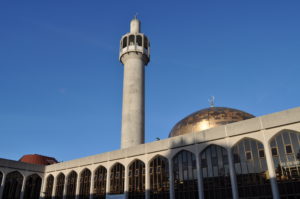by WorldTribune Staff, April 2, 2017
Britain’s capital city is now “more Islamic than many Muslim countries,” a leading Shia scholar said.
By 2020, estimates are that the number of Muslims attending prayers will reach at least 683,000, while the number of Christians attending weekly services will drop to 679,000.

The scholar, Maulana Syed Ali Raza Rizvi, who was born in Pakistan and studied in Iran, said he now “feels more Islamic” in Britain than other countries.
Welcome to “Londonistan”, where 423 new mosques have been built “on the sad ruins of English Christianity,” the Gatestone Institute said in an April 2 report.
Meanwhile, some 500 churches have shut down, converted to housing or, in some cases, mosques. The Hyatt United Church was bought by the Egyptian community to be converted to a mosque. St Peter’s Church has been converted into the Madina Mosque. The Brick Lane Mosque was built on a former Methodist church.
“Terrorists can not stand London multiculturalism,” London’s mayor Sadiq Khan said after the recent deadly terror attack at Westminster. According to Gatestone’s report, “the opposite is true: British multiculturalists are feeding Islamic fundamentalism.
“Not only buildings are converted, but also people. The number of converts to Islam has doubled; often they embrace radical Islam, as with Khalid Masood, the terrorist who struck Westminster,” the Gatestone report said.
Many jihadists live and plan in Birmingham, the UK’s second-largest city. There are petitions in Birmingham to allow British mosques to call the Islamic faithful to prayer on loudspeakers three times a day, the Gatestone report said. “There is also a greater probability” in Birmingham “that a child will be born into a Muslim family than into a Christian one.”
Given the current trends, Christianity in England is becoming a relic, while Islam will be the religion of the future.
While nearly half of British Muslims are under the age of 25, a quarter of Christians are over 65. “In another 20 years there are going to be more active Muslims than there are churchgoers,” said Keith Porteous Wood, director of the National Secular Society.
